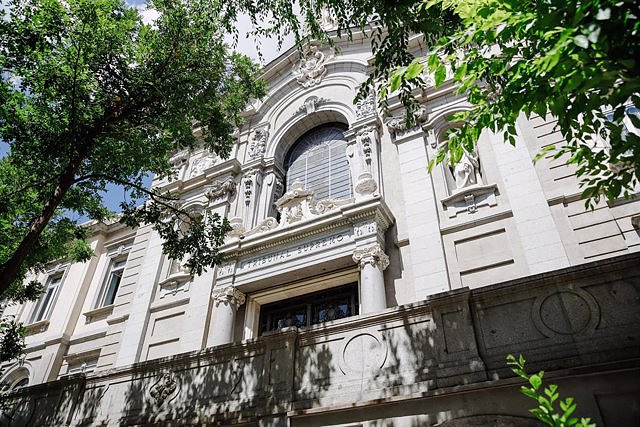Remember that "the essence of treachery is found in the annihilation of defense possibilities"
MADRID, 1 Feb. (EUROPA PRESS) -
The Supreme Court (TS) has reduced by 6 months the sentence to 10 years and 9 months in prison that the Provincial Court of Huesca imposed on a civil guard who stabbed another member of the Benemérita and the daughter of the latter in the middle of the street, while affected by "a delusional disorder of the persecutory type", considering that there was no treachery in the attack on the girl because his objective was not to prevent her from defending herself.
The Criminal Chamber of the TS, in a presentation by magistrate Andrés Martínez Arrieta, partially upholds the appeal filed by the convicted civil guard against the decision of the Superior Court of Justice (TSJ) of Aragon that confirmed the original sentence, issued by the Court of Huesca on April 5.
According to the account of proven facts contained in the Supreme Court ruling, to which Europa Press has had access, they occurred on May 2, 2020 in the city of Huesca, in the vicinity of the building where both the victims and the attacker lived. And it happens that the attacked and the attacker were civil guards, although "they belonged to different departments and had no special relationship."
However, the same account of proven facts reflects that that same day, hours before the attack, the assailant went to two neighbors -- with whom the victim's family had had problems, "to the point of having filed a complaint "-- through the light well and "said something like: 'I'm not from the guild, but he has my balls'". In addition, he "made a gesture, like squeezing" and added: "This is going to end very badly."
That afternoon, when the 51-year-old father and 16-year-old daughter went out for a walk with the dog, the assailant, who was returning from a nearby supermarket, approached the victims with a folding knife and, "without warning and from the back", stabbed the man once in the neck and three more in the neck, while addressing him saying: "Hello, bastard, how are you?"
He kept stabbing the man until the daughter tried to get between him and her father, for which she also took several stab wounds. After that, the condemned man attacked his father again, giving him a total of thirteen stab wounds. He stopped when a group of people passing by overpowered him, "to which he offered no resistance."
The magistrates state that at that time the convicted person "was affected by a persecutory-type delusional disorder. Specifically, they specify that" he considered himself the victim of a conspiracy in the context of which he was watched, poisoned and harassed by the Civil Guard (...) and he considered his neighbor (...) as one of the people who participated in this plot against him".
They detail that the convicted person "projected his imaginary ideas of persecution onto the victim, the events taking place the first day that citizens were allowed to go out after the initial moments of the coronavirus pandemic." Since February 19, 2019, he was on leave from work due to "anxiety".
For all these reasons, the Court of Huesca sentenced the civil guard to 9 years in prison for the crime of attempted murder with treachery and cruelty, and to 1 year and 9 months in prison for the crime of aggravated injuries due to the use of dangerous means and treachery, appreciating for both offenses the incomplete defense of mental disturbance.
Of all the reasons with which the man tries to overturn his sentence, the Second Chamber only agrees with him when he alleges that both the provincial court and the TSJ have "improperly" applied the aggravating circumstance of treachery with regard to the injuries caused to the victim's daughter.
The magistrates recall the jurisprudence of the Supreme Court, according to which the aggravating circumstance of treachery must be applied, "in all those cases in which, due to the way in which the aggression was carried out, the intention of the aggressor to commit the crime is evident, eliminating the risk that could proceed from the defense that the victim could make".
That is to say, "the essence of treachery is found in the annihilation of defense possibilities, or else in taking advantage of a defenseless situation, whose origins are indifferent," they state.
The Supreme Court affirms that "the motive must be estimated" because "the proven fact does not refer to a selection of a means, manner or form in the execution of the fact tending to ensure the result and prevent the means of defense."
"What the proven fact says regarding the assault on the minor is that she intervened between the aggressor and her father, who had already been the victim of four stab wounds, after which the defendant, without the intention of killing, carried out his action against the minor, to prevent her intervention in the facts," he says.
For the magistrates, "the use of a weapon does not come to found the application of treachery because it was not selected to ensure and impel the defense and, in addition, its use is the basis of the aggravation by the dangerous means."
Consequently, the Supreme Court ratifies the 9-year sentence for the crime of attempted murder, but modifies the sentence imposed for injury, which becomes 1 year and 3 months, 6 months less than the initial one.

 Exploring Cardano: Inner Workings and Advantages of this Cryptocurrency
Exploring Cardano: Inner Workings and Advantages of this Cryptocurrency Seville.- Economy.- Innova.- STSA inaugurates its new painting and sealing hangar in San Pablo, for 18 million
Seville.- Economy.- Innova.- STSA inaugurates its new painting and sealing hangar in San Pablo, for 18 million Innova.- More than 300 volunteers join the Andalucía Compromiso Digital network in one month to facilitate access to ICT
Innova.- More than 300 volunteers join the Andalucía Compromiso Digital network in one month to facilitate access to ICT Innova.-AMP.- Ayesa acquires 51% of Sadiel, which will create new technological engineering products and expand markets
Innova.-AMP.- Ayesa acquires 51% of Sadiel, which will create new technological engineering products and expand markets STATEMENT: ELFBAR and LOST MARY reveal progress in the fight against illicit vapers (1)
STATEMENT: ELFBAR and LOST MARY reveal progress in the fight against illicit vapers (1) STATEMENT: ELFBAR and LOST MARY reveal progress in the fight against illicit vapers (2)
STATEMENT: ELFBAR and LOST MARY reveal progress in the fight against illicit vapers (2) The PSOE is holding a Federal Committee this Saturday that will serve to close ranks with Sánchez so that he does not resign
The PSOE is holding a Federal Committee this Saturday that will serve to close ranks with Sánchez so that he does not resign The Ibex 35 closes the week at its highest since 2015 and is already looking at 11,200
The Ibex 35 closes the week at its highest since 2015 and is already looking at 11,200 How Blockchain in being used to shape the future
How Blockchain in being used to shape the future Not just BTC and ETH: Here Are Some More Interesting Coins Worth Focusing on
Not just BTC and ETH: Here Are Some More Interesting Coins Worth Focusing on UPV students build a prototype of a wooden house to move to Equatorial Guinea
UPV students build a prototype of a wooden house to move to Equatorial Guinea The UA opens the call for the Impulso 2024 Awards for the best innovative business initiatives
The UA opens the call for the Impulso 2024 Awards for the best innovative business initiatives ALI, virtual assistant from Alicante, internationally recognized by the OECD
ALI, virtual assistant from Alicante, internationally recognized by the OECD Retrópolis brings the golden age of video games and computing to the UPV
Retrópolis brings the golden age of video games and computing to the UPV A million people demonstrate in France against Macron's pension reform
A million people demonstrate in France against Macron's pension reform Russia launches several missiles against "critical infrastructure" in the city of Zaporizhia
Russia launches several missiles against "critical infrastructure" in the city of Zaporizhia A "procession" remembers the dead of the Calabria shipwreck as bodies continue to wash up on the shore
A "procession" remembers the dead of the Calabria shipwreck as bodies continue to wash up on the shore Prison sentences handed down for three prominent Hong Kong pro-democracy activists
Prison sentences handed down for three prominent Hong Kong pro-democracy activists ETH continues to leave trading platforms, Ethereum balance on exchanges lowest in 3 years
ETH continues to leave trading platforms, Ethereum balance on exchanges lowest in 3 years Investors invest $450 million in Consensys, Ethereum incubator now valued at $7 billion
Investors invest $450 million in Consensys, Ethereum incubator now valued at $7 billion Alchemy Integrates Ethereum L2 Product Starknet to Enhance Web3 Scalability at a Price 100x Lower Than L1 Fees
Alchemy Integrates Ethereum L2 Product Starknet to Enhance Web3 Scalability at a Price 100x Lower Than L1 Fees Mining Report: Bitcoin's Electricity Consumption Declines by 25% in Q1 2022
Mining Report: Bitcoin's Electricity Consumption Declines by 25% in Q1 2022 Oil-to-Bitcoin Mining Firm Crusoe Energy Systems Raised $505 Million
Oil-to-Bitcoin Mining Firm Crusoe Energy Systems Raised $505 Million Microbt reveals the latest Bitcoin mining rigs -- Machines produce up to 126 TH/s with custom 5nm chip design
Microbt reveals the latest Bitcoin mining rigs -- Machines produce up to 126 TH/s with custom 5nm chip design Bitcoin's Mining Difficulty Hits a Lifetime High, With More Than 90% of BTC Supply Issued
Bitcoin's Mining Difficulty Hits a Lifetime High, With More Than 90% of BTC Supply Issued The Biggest Movers are Near, EOS, and RUNE during Friday's Selloff
The Biggest Movers are Near, EOS, and RUNE during Friday's Selloff Global Markets Spooked by a Hawkish Fed and Covid, Stocks and Crypto Gain After Musk Buys Twitter
Global Markets Spooked by a Hawkish Fed and Covid, Stocks and Crypto Gain After Musk Buys Twitter Bitso to offset carbon emissions from the Trading Platform's ERC20, ETH, and BTC Transactions
Bitso to offset carbon emissions from the Trading Platform's ERC20, ETH, and BTC Transactions Draftkings Announces 2022 College Hoops NFT Selection for March Madness
Draftkings Announces 2022 College Hoops NFT Selection for March Madness























